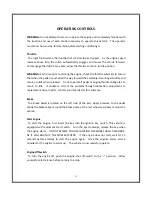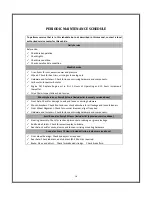
13
Service
Instructions
ENGINE LUBRICATION Ensure that you follow the procedures outlined in the engine owner's manual that is
provided as a supplement to this manual. Failure to follow procedures could reduce the life of your engine.
VEHICLE LUBRICATION - Every two or three hours of use lubricate the following items with several drops of
oil; steering bearing points, brake rod pivot points, pedal pivot points, steering spindles, and steering rod ends.
Use the same grade of lubricating oil that is used in the engine crankcase.
CHAIN LUBRICATION - For the best chain life, it should be lubricated with a graphite type lubricant such as
the spray-on type which evaporates leaving the graphite on the chain. Using oil or grease on the chain in
dusty or sandy riding conditions may cause dirt particles to stick to the chain resulting in rapid wear from
abrasion.
FRONT WHEEL REPLACEMENT - Care must be used when replacing wheels. DO NOT OVER-TIGHTEN
AXLE NUTS. It is only necessary to tighten the nuts so that the wheel turns freely on the axle with minimum
end play. If the wheel does not turn freely the nut is too tight.
REAR WHEEL REPLACEMENT - Loosen the large locknut in the center of the wheel to remove the rear
wheel.
CHAIN ADJUSTMENT - After the first two hours of operation, check the chain adjustment and readjust it if it
has more than 3/8" flex. Loosen the engine clamp nuts and slide the engine and jack shaft assembly
rearward to tighten the chain. Allow about 3/8" flex for proper adjustment. Tighten the nuts securely. On
models equipped with a centrifugal clutch, the engine may need to be moved forward to tighten the chain.









































